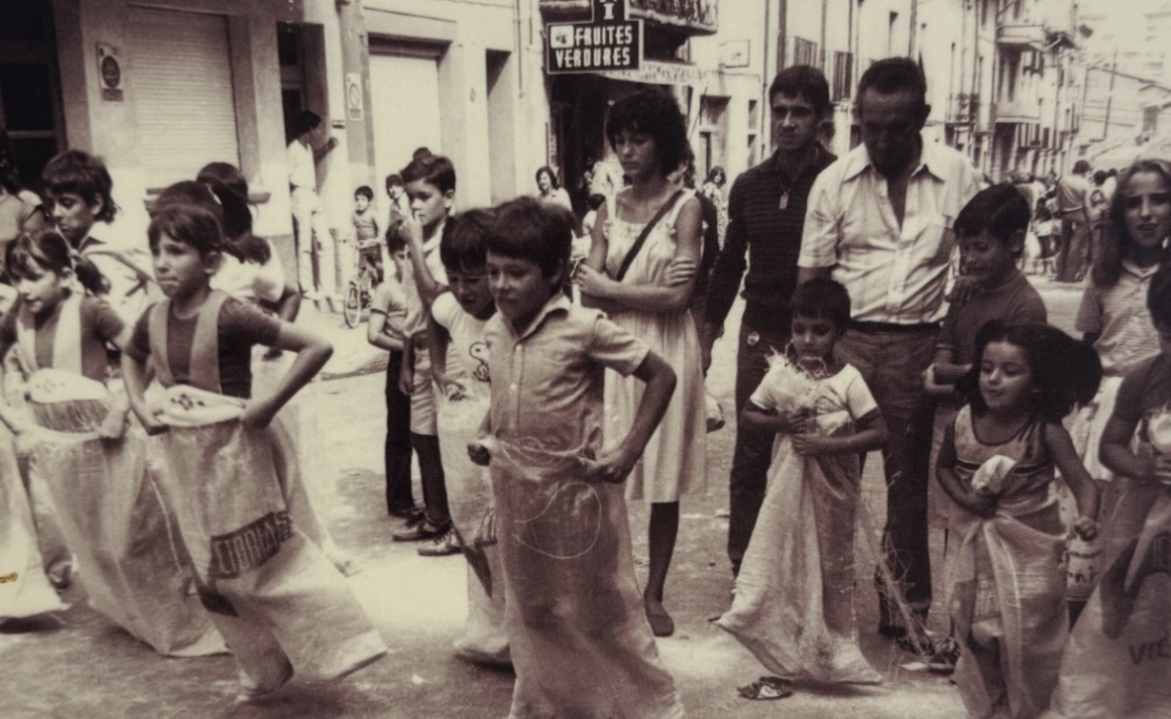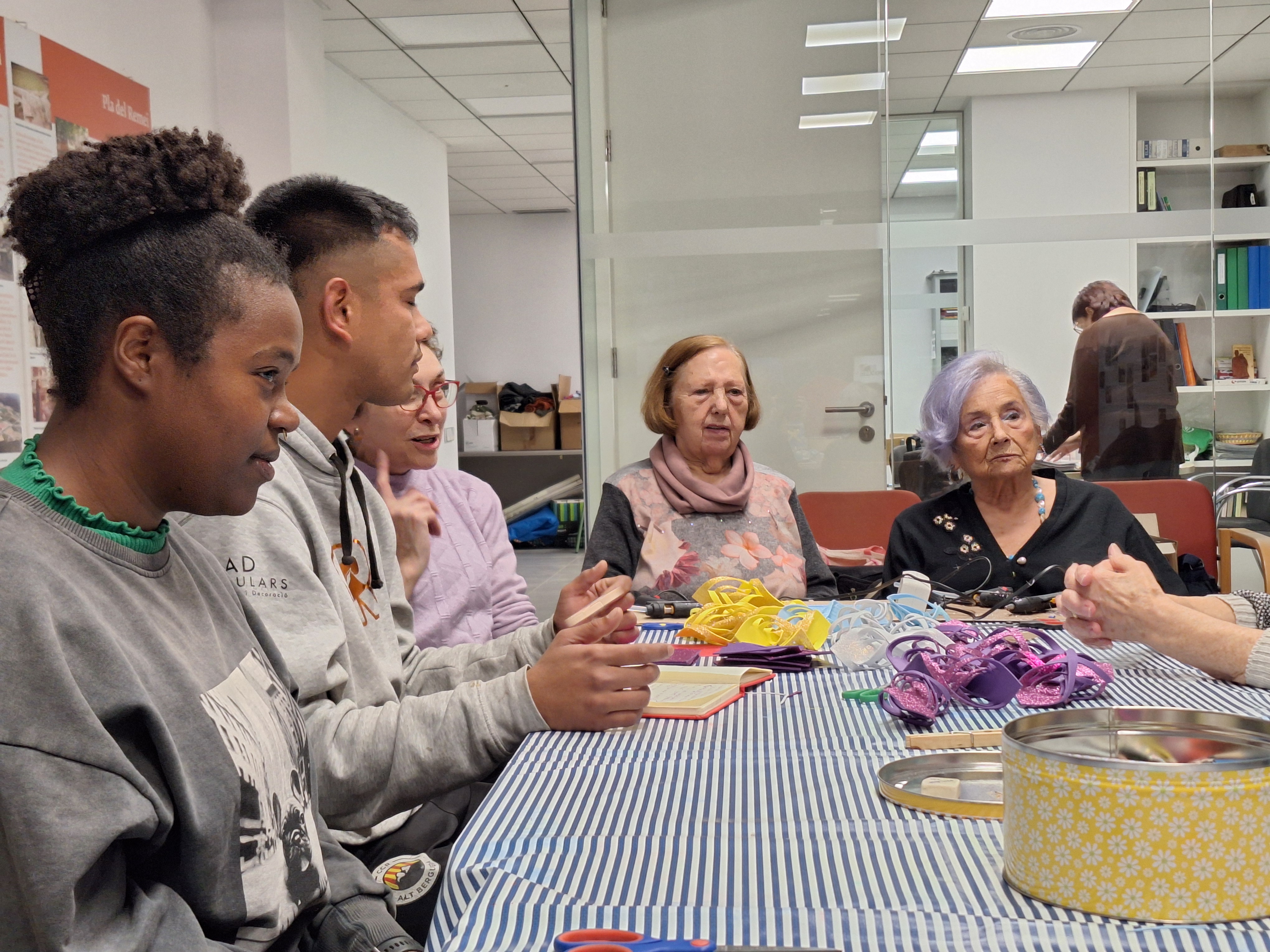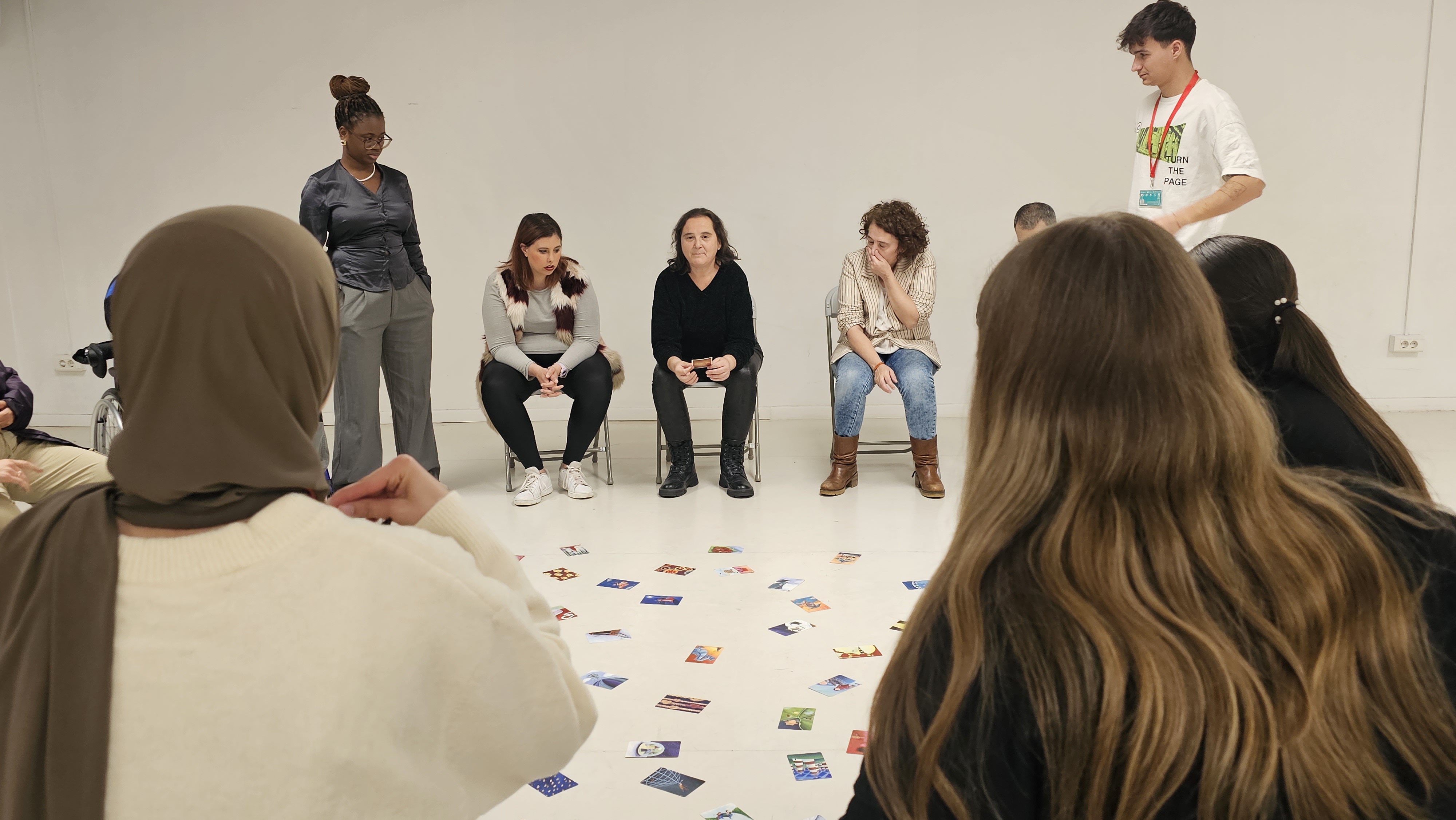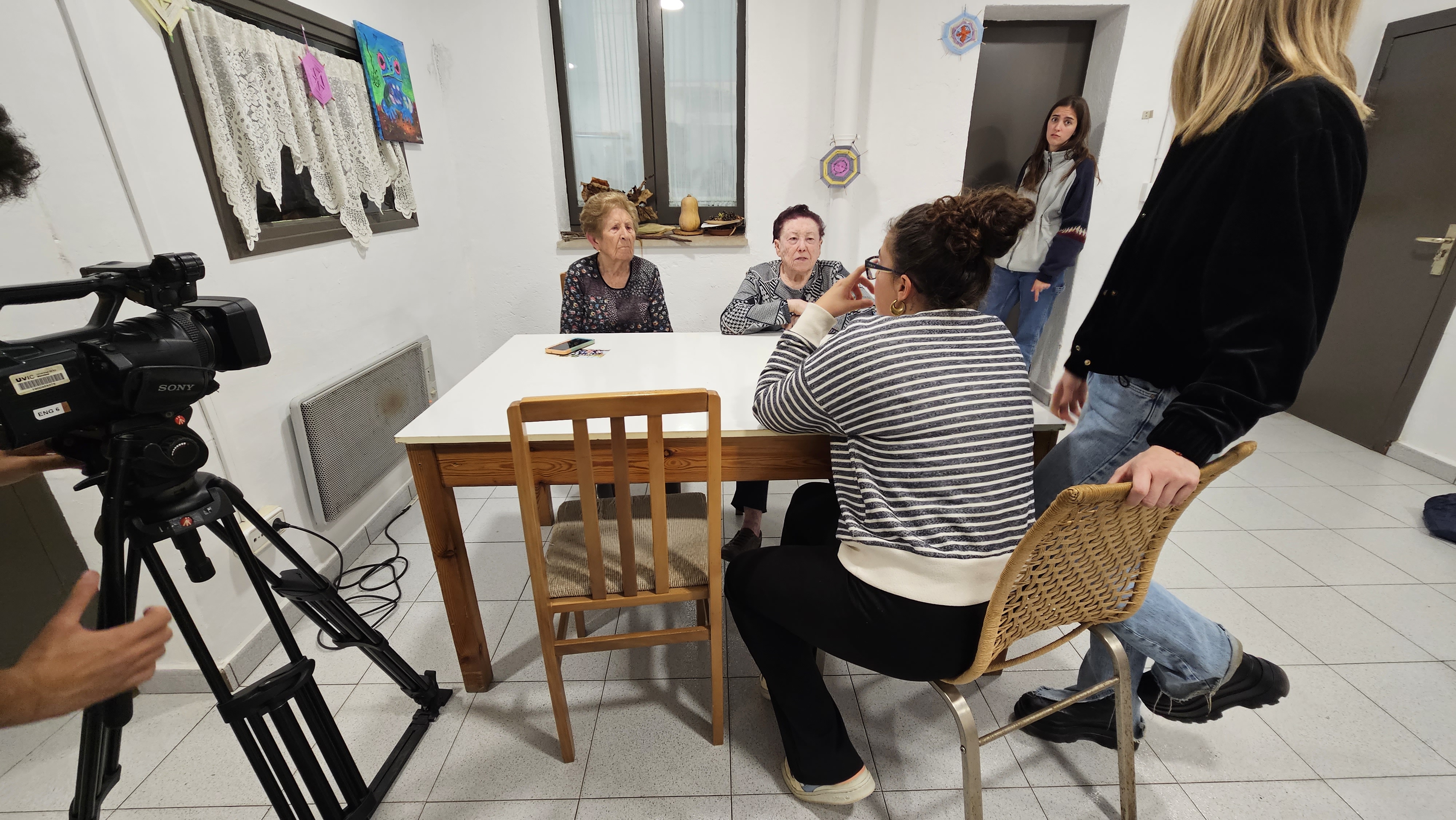Project Description
Type of project
Learning- Service
Course
2023-2024
Studies
Social Projects and ICT. 3rd course Degree in Social Education
Feminist Falca
Participating entity: Fera Ferotge
Description of L-S
Creation of a skirt against male violence and LGTBIfòbiques to disseminate in daytime and nighttime leisure spaces in the Osona region.
Participants: young people from Fera Fertoge
Objectives:
- To promote attitudes and criteria against sexist and LGTBphobic violence through the creation of a commercial to be broadcasted in leisure spaces.
- Create a cooperative work community.
- Improve the social and digital skills of the participants.
Reflections of UVic students
- This project gives us the opportunity to visit different spaces, to know the social cooperative of the Fera Ferotge from the inside with the educators as well as with the young participants. However, it gives the opportunity to the people who have participated in the project to explore the University of Vic, its spaces and facilities and the community of people we are immersed. That is why we value that this project takes into account everyone and encourages the participation of all, in a bidirectional way.
- Decisions have been made in a horizontal manner, taking into account all the members of the group and valuing each issue or proposal that has arisen throughout the process.
- We went to meet the young people at the Fiera Feroz. We organized three icebreakers. Later we divided into two groups. One group was in charge of creating the lyrics of the song, and the other group was in charge of creating the base. We did not get a lot of lyrics, because it was difficult for the young people to understand what we wanted the lyrics to say, there was a big language barrier, and some people were more motivated than others. Those in the base group achieved a base that was very appropriate to the reality of the young people. We went out of that session with a different thought, since the fact to see the young people much *conconcontextualitzats, and the little interest that was shown and the fact that they did not understand the motive on why *estàven there, confused us a little.
- We met with the youth at UVic so they could see the music room and start creating a base and lyrics. After a while playing the instruments and looking at bases that we could use, we listened to the songs of one of the young people. This young man is a singer and has several songs. Then we got a base from him. Finally, we started working on the lyrics. As an improvement, we believe that we could have created activities with the young people using the spaces and materials of the music classroom, since we were left with a feeling of discomfort due to the lack of commitment.
- Different topics are put on the table: Leadership, the role of the beast/students/young people, demotivation, roles that we have assumed (or not) within the work team, non-palpable learning, lack of optimism, remuneration with learning from this project, evaluation of the subject… With this small parenthesis we have been able to understand, evaluate and change course some of the attitudes, learning, responsibilities that we are living until today towards the entity, the young participants and ourselves as a team.
- From the beginning we were faced with the situation that we did not have young people, a fact that prevented us from carrying out the initial assessment. Despite this initial difficulty, the previous diagnosis allowed us to understand the context in detail. We were able to identify the specific needs and some of the characteristics of the young people. This diagnostic process provided us with a solid basis on which to plan future actions, even though we did not have youth involved from the outset. However, it should be noted that this lack of participants somewhat destabilized the beginning of the project, since it was difficult for us to understand how to carry out a *co-cooperative project without young people.
- The follow-up evaluation took place on the day that a blockage appeared as a group, caused by lack of motivation, lack of understanding with the entity, lack of defined roles within the group and a generalized malaise. Faced with this situation, we chose to meet with the tutor, who helped us to mediate the situation and provided us with positive and encouraging points of view. Thanks to this small parenthesis, we were able to understand, value and change the course of some attitudes and learning. We also talked about all the non-palpable learnings, an aspect that concerns us a lot since we consider that we have done a lot of work that is not reflected as such. Even so, these learnings are reflected in each one of us after creating this space of trust to expose our concerns and recognize the shortcomings and responsibilities that we are living up to today towards the entity, the young participants and ourselves as a team. We consider this process of stopping, breathing and reflecting as a great follow-up tool to be able to continue with the project, finding again the initial motivation with which we undertook this initiative.
- As for the final evaluation, we organized a picnic with the young people to close the project, with the objective of creating a more relaxed and informal space where they could share their feed-back on how they have experienced the whole process. This format allowed us to establish a more fluid and open communication, where the young people felt comfortable to express their opinions and feelings. During this meeting, the participants let us know that they have felt very comfortable since the beginning of the program. They especially emphasized the welcome we gave them and the constant companionship they have had throughout the project. These positive evaluations fill us with satisfaction and confirm that we have managed to create a welcoming and trusting environment, which is essential for the personal development and learning of the young people. Even so, as a proposal for improvement and to encourage the use of Information and Communication Technologies (ICT), we believe that it would have been a good idea to involve the young people in the creation and editing of the final video of the project. This would have allowed them to acquire new digital skills, which are very important in today’s world, and would have increased their participation and commitment to the project.
- During this brief but intense time, we have had the opportunity to create an S-L project that has proven to have an impact beyond the service itself. The main objective of creating a feminist falca has been achieved, but as a group, we agree that the process has been much more meaningful and enriching than the result.
- The process of creating a feminist falca together with some of the young people and educators of the Fera Ferotge organization has allowed us to work collaboratively, favoring group cohesion and the development of transversal competencies such as adaptation, problem solving and critical thinking. At times we have learned to listen to each other and to integrate different perspectives, which has enriched our perspective of feminism and its application in educational and social contexts.
- During the process we have encountered several limitations, such as lack of time. For the future, in this particular case we propose a better time planning, preferably in the long term, as well as the research of additional resources, such as collaborations with professionals in the audiovisual or music sector, to improve the final quality of the product and the organization.
- We believe that every proposal has to be adapted to the context and the specific reality. In this case, we debated a lot about whether the group of people chosen was the right one for the proposed project. After the experience, we still believe that the proposal could have been more successful with another group of people, since the fact that they came from such diverse realities meant that they had a different conception or perspective on the subject.
- The language barrier has been a complication for the project in two different aspects that affect two of the proposed objectives. On the one hand, it has affected communication with the young people of the organization, because we do not know for sure if they have fully understood the purpose of the project. On the other hand, it has affected the lack of fluid communication with them. On the other hand, it has affected the moment of creation of the falca. This has made it difficult to understand the social context in which we were working, as well as the moment of recording when they had to sing in a language they did not know and were hardly aware of what they were saying.
- We think that at all times, whenever necessary, we have talked and tried to raise awareness among young people about gender violence, from the point of view of sensitivity and understanding. In relation to this, for the future, we believe that in the creation of a project it is necessary to previously inform the people with whom the project will be carried out in order to give meaning to what we are doing.
- The debate arose over whether to include men’s voices in the feminist falca. This discussion arose because, while some of us felt that the falca had to be exclusively a platform for female voices, others felt that the inclusion of male voices could enrich the message and promote a broader involvement in the struggle for gender equality. After careful deliberation, we decided to accept the perspective of incorporating the male voice into the falca. This decision was based on the idea that men or cisgènere people also have to be an active part of the social change needed to eradicate gender violence and promote equality and gender *perspective. We believe that giving space to male voices in this context can help to foster greater awareness and responsibility among men, as well as to break gender stereotypes that often perpetuate inequalities. Thus, the inclusion of men in the falca not only broadens the reach of our message, but also reinforces the idea that the feminist struggle is a cause that benefits all of society.
- Despite the low participation of young people, we value very positively the commitment of the few who have come, since they have attended every day and have been able to experience a different environment to which they are accustomed, such as the University. This has given them an enriching experience. They have had the opportunity to learn about the academic world, interact with professionals and university students, and develop skills that will be useful in the future, such as effective communication, teamwork and problem solving. In addition, the fact that they were able to participate in the falca, and have put their voices in it, has given them a sense of excitement. Finally, this experience has given them the opportunity to build a network that has had a very positive impact on both the young people and on us.
- As for our role as social educators, when working in a network, whether to create proposals or to coordinate with other professionals, we believe that leadership, adaptation and flexibility, anticipation, proactivity, initiative, communication, listening, individual responsibilities and the ability to make decisions are essential. These skills are essential to ensure the effectiveness, coordination and positive impact of the projects to be created by the community. Moreover, in any case, we think it is important to know the interests of the people with whom we will work, to motivate them, to take advantage of their abilities and skills, and to take them into account.
- As a group self-evaluation, we would like to point out that at specific moments we have noticed a lack of leadership among us; in spite of this, we believe that we have to know how to stop at several moments and analyze what was going on. This process has been complicated also due to the lack of involvement and motivation on the part of the members of the group; we have learned that it is important that the people who carry out the project are involved and motivated, as well as, to maintain a constant and fluid communication with all the members of the project.
- We believe that, at certain times, the roles assumed within the group have been very diverse and insufficient; in spite of this, we believe that we have been able to overcome and redirect it so that the project could finally meet most of the objectives.
- We think that we have learned a lot, although it has been difficult to value them, but finally, we all agree that what we value most is everything we have learned about socio-educational projects and how we will approach them in a professional future as social educators. In relation to this, one of the most relevant learnings is that a good diagnosis is necessary to propose projects appropriate to the target people and to the context. In addition, we have learned that the ideology from which the projects are proposed is an important part of them. Also, we have been able to adapt to all the situations we have experienced during this process, as well as the interests of the learners and the opinions of the educators of the entity. And, finally, we have learned that it is essential that the objectives are achievable and appropriate to the context.











